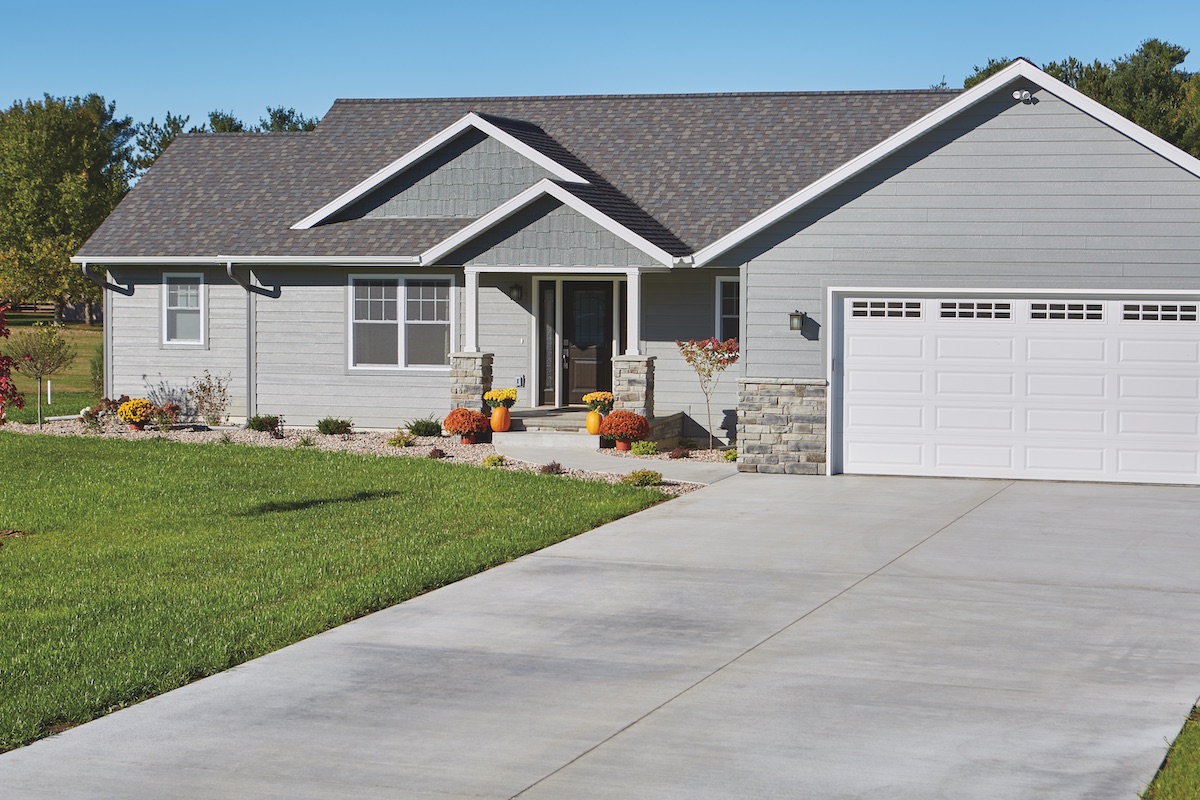
The Benefits of a Concrete Driveway
Concrete Driveway Colorado Springs are preferred by many homeowners for their durability, versatility, and attractive appearance. They also indicate quality construction from the first impression and add value to homes.
Homeowners who opt for a concrete driveway should settle on the dimensions early on, since changing them at the last minute can affect the cost. This will determine the amount of concrete needed to be delivered.
Concrete is a durable material that can last up to 50 years or more with little maintenance. It is also an eco-friendly choice because it can be recycled. It also reflects heat instead of absorbing it, making it pleasant to walk on in the summertime. It can be stained in a variety of colors and finishes to match any design style. Additionally, concrete is easier to remove snow from than asphalt.
While concrete is more expensive than asphalt, it is worth the investment since it can last longer and requires less upkeep. However, the quality of a concrete driveway depends on how it is installed. It is important to hire a professional paving contractor who has experience with concrete installation. They will ensure that the proper concrete mix and slump are used for the climate, as well as slope for drainage purposes.
The thickness of a concrete driveway is also an important factor in durability. Non-reinforced pavement is typically four inches thick, but in areas with freezing winters, a concrete driveway should be at least eight inches thick to protect against cracking and damage caused by the freeze-thaw cycle. A reputable paving company will measure the thickness of your existing driveway before laying new concrete and advise you on the appropriate thickness for your climate.
Concrete driveways are long-lasting and require very little upkeep, which makes them a great investment for homeowners. They are extremely durable and can withstand heavy traffic, including trucks. In addition, they are easy to repair if there are any cracks or chips.
However, the most important factor in determining the longevity of your concrete driveway is how it is maintained. To avoid damaging your concrete driveway, it is best to keep vehicles off it until it has cured properly. Concrete requires seven days to cure completely before you can drive on it. It is important to make sure that the concrete is sloped one percent towards the street for proper drainage.
Concrete is a versatile material that can be used for many different types of driveways. It can be tinted in any color, stamped with a pattern, made to look like brick, or brushed to create a textured finish. It can even be left with the aggregate exposed to add a natural texture to your driveway. If you want to add a decorative flair, consider using acid stains or etching techniques to achieve a unique, eye-catching appearance.
Maintenance
Concrete is a durable material, but it does require maintenance to keep it looking good. Regular sweeping and cleaning remove dirt and stains and help protect the surface from weather damage. Sealers are also a good idea to protect the surface from stain absorption. You should check your driveway regularly for cracks and chips and promptly repair them. It’s also important to remove organic debris, including leaves and lawn clippings, on a regular basis. If the roots of a tree creep up on your driveway, you may need to root-prune them.
If you’re considering a new concrete driveway, it is important to plan your project carefully. This is because the concrete must cure before it can be used, which takes a minimum of two weeks. During this time, the concrete undergoes a chemical process that makes it stronger and harder. To speed up the curing process, it is recommended that you regularly dampen the concrete.
Once the curing process is complete, it’s a good idea to apply a coat of protective concrete sealer. This will protect your driveway from oil stains, rain damage, and wear and tear. You should also reseal the driveway every two to five years, depending on your climate and traffic.
In addition to protecting your concrete from water damage, a sealer can make it easier to clean and keep the surface free of moss and weeds. Be sure to use a product that is designed for driveways, as other sealants can discolor the concrete. It’s also a good idea to keep trees and shrubs away from your concrete, as their roots can deteriorate the surface.
A concrete driveway requires routine cleaning and inspections to prevent damage. It’s important to sweep the driveway regularly to avoid leaving behind dirt or grime that can stain it. You should also regularly wash the driveway with a mild cleaner to remove stains and keep it clean. You should also avoid using de-icing chemicals on concrete, as they can cause surface damage.
It’s also a good idea to clean up any leaky oil or gasoline from vehicles on your concrete driveway, as these can penetrate the surface and leave unsightly stains. It’s also a good idea not to park cars or trucks on your concrete driveway for long periods of time, as this can lead to cracking.
Aesthetics
The driveway is a large component of your home’s exterior and offers an opportunity to make your house stand out from the rest. A driveway that combines beauty with functionality enhances your property’s curb appeal and increases its resale value. It also provides a welcoming first impression to visitors and guests who enter your property. Concrete is a durable material that lends itself to many aesthetic enhancement techniques, including staining and stamping. Concrete can be shaped and colored to fit the architectural style of your home, and it comes in a variety of color options that complement any landscape design.
If you are looking for a modern look, choose a concrete slab with a gray or charcoal finish to blend in with the surroundings and minimize visual distraction. Lightly texture the concrete for added interest, but keep in mind that too much textured concrete may cause it to wear prematurely due to increased foot traffic.
Achieve a laidback Nantucket look with a mix of organic-shaped stone pavers and concrete slabs. The textured concrete and grass combination creates a calming and welcoming entrance for vehicles and guests.
Creating a unique driveway with a pattern is a simple way to add visual interest to your property. For example, this Nantucket-styled driveway has a square-themed pattern that stands out among the rest of the house and the lush green lawn.
Another option is to create a textured concrete surface with a pattern, but opt for a smooth finish around the edges. This will eliminate the contrast between coarse and smooth surfaces that can create an uneven surface.
For a more rustic look, choose aggregate concrete that contains pebbles and other small elements for a naturally appealing appearance. This is a popular choice for driveways because it can withstand a lot of pressure and add a unique look to the property.
While a concrete driveway is durable and low-maintenance, minor cracks are unavoidable in certain climates. However, you can reduce the likelihood of these cracks by installing proper installation methods and using high-quality concrete. Also, concrete shrinks slightly as it sets, so properly spaced joints allow for contraction and expansion while reducing the risk of damage.
Cost
Concrete is a durable material that is an excellent choice for driveways. It can withstand heavy traffic and will last for 50 years or more if properly maintained. It is also highly customizable. You can choose from a wide range of textures, colors, and patterns to create a unique design that complements your home. In addition, you can add decorative elements to the concrete to make it even more beautiful. These extras can increase the cost of your concrete driveway project, but they are worth the investment.
The cost of a concrete driveway can vary greatly depending on its size, location, and other factors. However, you can get a rough idea of how much it will cost by calculating the square footage of the area to be filled. This can be done by multiplying the length and width of the driveway in feet. A professional contractor will be able to give you an accurate estimate based on the specific details of your driveway.
Besides the cost of the concrete itself, you will also have to pay for the labor and other materials needed to install the driveway. The cost of labor will depend on the number of workers and their experience. It is best to hire a concrete driveway specialist to do the job, as they have the necessary skills and tools to complete the task quickly and accurately.
Some additional costs may include excavation and base preparation. If the driveway is going to be over an existing surface, it will require excavation to remove any debris and prepare the site for concrete pouring. Adding a wire mesh base to the concrete can help prevent cracking and extend its life, but it will add to the overall cost.
Another important factor is the thickness of the concrete. Non-reinforced concrete should be at least four inches thick for passenger cars, while five inches is recommended for heavier vehicles. If your driveway is on a slope, the contractor will need to grade it to ensure proper drainage. This can add up to several thousand dollars.
